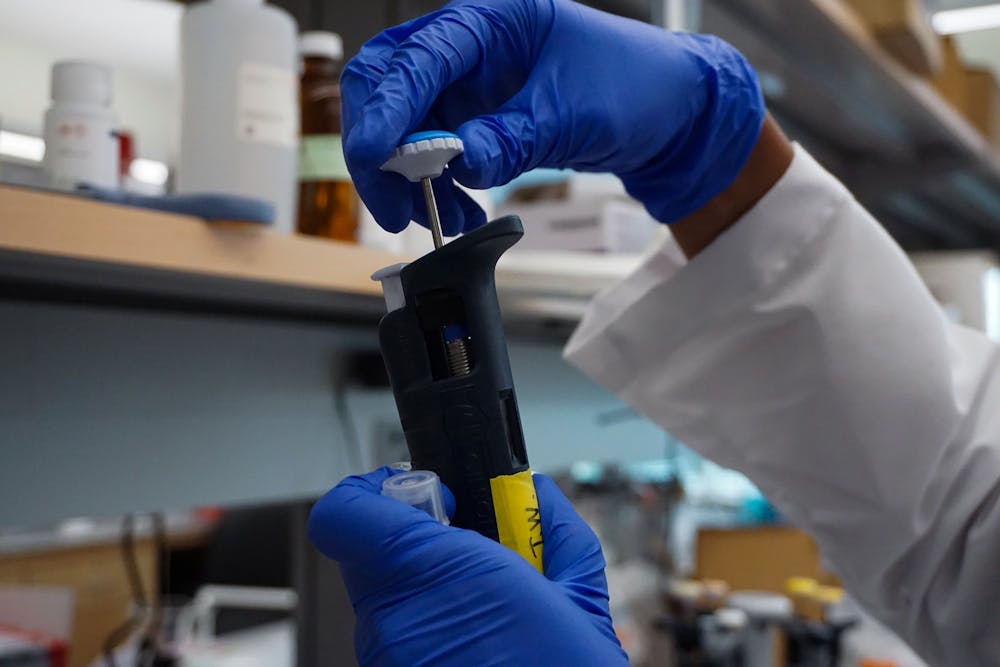
Penn Medicine research laboratories will begin to re-open in shifts with 25% increase in capacity starting June 1.
Credit: Sukhmani KaurAfter announcing a three-phased reopening for research labs on campus in mid-May, the University is set to begin its first phase of reopening for research labs on June 1.
Phase I and II will only allow volunteering graduate students to return to labs. Only research deemed essential and prioritized by the University will begin in Phase I and it is not until Phase III that all research, including undergraduate research, will resume.
On March 16, the University halted all nonessential on-campus research in an effort to prioritize health and safety of the scientific community amid coronavirus concerns. Essential research was deemed as work including animal care, necessary equipment maintenance, computer cores, tissue banks, cell lines, and COVID-19 related projects.
Labs have been operating at less than 10% of normal capacity, with researchers observing social distancing and hygiene protocol, while also wearing appropriate personal protective equipment as recommended by the Centers for Disease Control and Prevention.
Since the shutdown, Vice Provost for Research Dawn Bonnell and two Research Resumption Task forces have convened to initiate a plan of resuming research at Penn Medicine.
In conjunction with the Graduate School of Education, the University's Research Resumption Task Forces have deemed graduate students and postdocs able to opt in to research once completing a COVID-19 training module before returning to research in June.
Based on the state and health policies, the shift from Phase I to II will allow for the expansion of research operations with 50% of the normal population practicing social distancing norms. Labs will be required to submit a resumption request approval form in order to invite non-essential researchers back to campus.
“The criteria for how we transition between each phase depends on the success in social distancing and practices in place, whether there is non-compliance, and what the rate of transmission looks like,” Bonnell said in a virtual town hall event March 26.
In Phase III, the objective is to return to pre-closure operations in full research capacity with “new steady-state health and safety practices” in place, according to the Research Resumption Strategy Master Plan.
Similar research policies are in place with Penn-affiliated Children’s Hospital of Philadelphia in University City. CHOP transitioned from minimal to a 25% level lab capacity starting on May 26.
After Penn ended all on-campus instruction for the semester, many students were forced to pause their ongoing research projects at laboratories throughout Penn Medicine and CHOP.
Although the University-wide email sent last Thursday mentioned three distinct phases of re-opening on-campus research, many students remain uncertain about what the future of research will look like for them.
“The email did not explicitly mention how this would affect undergraduate research,” rising College junior Emilie Dávila said, who has been working for her PURM neuroscience laboratory this summer from her home in Puerto Rico.
Dávila said she will continue her work remotely as much as possible and will continue to attend weekly virtual lab meetings, where she receives updates on lab progress and any information on returning into her lab in-person.
Like Dávila, rising Vagelos Molecular Life Sciences senior Richard Duan said his lab, which investigates different kinds of tumor growth, also holds weekly virtual meetings. Though his work has continued, he said it did not compare to the robust research experience on campus.
“I was working 12 hours a week during the school year and 40+ hours during the summer on my project until we were sent back home,” Duan said.
Rising College senior Victoria Wu said the pandemic has not fully delayed her research. She said she is currently completing her research paper and continuing data analysis for her radiology oncology lab at the Smilow Center for Translational Research.
“The pandemic has forced people to think of creative ways to complete research as effectively as they can without the [in-person] work," Wu said.
The Daily Pennsylvanian is an independent, student-run newspaper. Please consider making a donation to support the coverage that shapes the University. Your generosity ensures a future of strong journalism at Penn.
Donate




